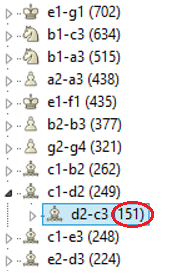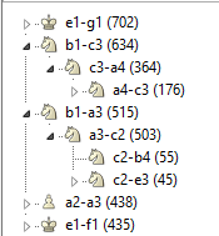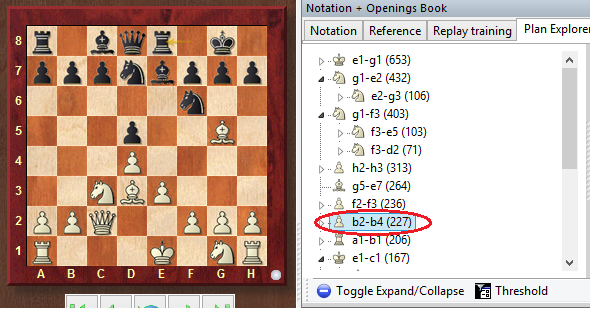|
Plan Explorer |

|

|
|
|
Plan Explorer |

|

|
Plan Explorer
Good theoretical knowledge together with the accompanying rote learning of the most important complexes of variations are indispensable for every ambitious tournament player.
But one aspect of the study of openings is frequently underestimated: in order to play an opening well, it is extremely important to get to know the middlegame positions which arise from it and above all to understand the positional plans appropriate to these middlegame positions.
Help is available here with the Plan Explorer which lists in a Windows Explorer type view the various plans including the relevant games employing each of them.

The function is started by a click on the tab “Plan Explorer” in the notation window.
The following example demonstrates the function through the basic position for the Advance Variation of the French Defence, a variation which is rich in strategic plans.
1. e4 e6 2. d4 d5 3. e5 c5 4. c3 Nc6 5. Nf3 Qb6 6. Be2 cxd4 7. cxd4 Nge7

Plan Explorer lists next to the chess board the possible continuations for White whose move it is in the position displayed. The sort order is determined by the number of games taken into account.
The number of games is displayed in brackets beside the move.

As in Windows Explorer the user can see from the small arrow symbol in front of an entry that in this case there is more content to be seen.
A click on the arrow in front of Nb1-c3 opens up the sub-structure:

Plan Explorer now lists plausible continuations for the knight in the board position displayed.
The Plan Explorer view then offers further help.
Below Plan Explorer you will find a list of games. There the program lists games in which the search for manoeuvres has found the motifs displayed. Here you will immediately find material to review about how to proceed and you can take a look at how other players have employed the typical plans in their games.
Next to the display of the list with the possible continuations you will find further useful supplementary information.

Plan Explorer creates a points system for those manoeuvres which offer the best prospects of success. With it the user quickly recognises which manoeuvres are particularly promising in the board position which is currently being displayed.
The function offers, e.g., useful hints as to which squares specific pieces are best posted on within a system.
Where is the rook best placed? Where is the best place for me to put the knight?
On the basis of the games evaluated, the program is able to give specific answers to these questions.
Let us take for example the Exchange Variation in the Queen’s Gambit which arises after the following moves.
1. d4 d5 2. c4 e6 3. Nc3 Nf6 4. cxd5 exd5 5. Bg5 Be7 6. e3 O-O 7. Qc2 Nbd7 8.Bd3 Re8

The standard procedure for White consists of the minority attack by means of b2-b4.
In the present position this move would simply give away a pawn and for that reason is displayed neither in the reference search nor in LiveBook. Plan Explorer shows the correct procedure here because you can see immediately from the high evaluation accorded to the pawn move that in the given position this way of proceeding is positionally and strategically justified.
In the Plan Explorer you can define a threshold for manoeuvres.

That allows the user to define when a plan is to be displayed in the Explorer.

Reference value is the most frequently played plan.